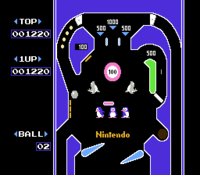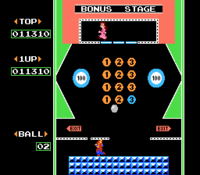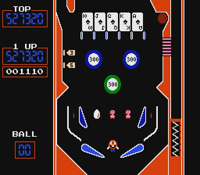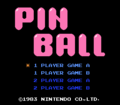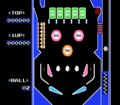Pinball (game)
| Pinball | |
|---|---|
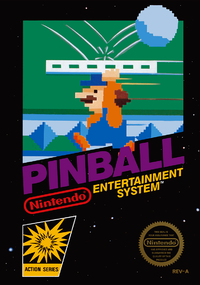 For alternate box art, see the game's gallery. | |
| Developer | Nintendo EAD[citation needed] |
| Publisher | Nintendo |
| Platform(s) | NES, VS. System, Family Computer Disk System, e-Reader, Virtual Console (Wii, Wii U), Nintendo Switch (Arcade Archives, Nintendo Entertainment System - Nintendo Switch Online) |
| Release date | Famicom/NES: Template:Release VS. System: Template:Release Disk System: Template:Release e-Reader: Template:Release Wii (Virtual Console): Template:Release Wii U (Virtual Console): Template:Release Nintendo Switch (Arcade Archives): Template:Release Nintendo Entertainment System - Nintendo Switch Online: Template:Release[?] |
| Genre | Pinball |
| Mode(s) | Single player, multiplayer |
| Input | Arcade: Joystick NES:
Wii: Wii U: Nintendo Switch:
|
Pinball is a game released for the Family Computer in 1984 and the Nintendo Entertainment System in 1985. It is based on the arcade machine of the same name. A competitive multiplayer version of this game was released on the VS. System under the name VS. Pinball. Hudson Soft had planned to release ports of Pinball for home computers in Japan in 1985, but these ports were cancelled for unknown reasons.[1] The Family Computer version was preceded by a Game & Watch version in December 1983.[2] However, this version has no Mario elements.
The NES version of Pinball was re-released on the Family Computer Disk System, for the Game Boy Advance's e-Reader as part of Series One, on the Virtual Console for the Wii and Wii U, and on the Nintendo Entertainment System - Nintendo Switch Online application for the Nintendo Switch. The Japanese version of VS. Pinball was re-released worldwide for the Nintendo Switch as part of Hamster Corporation's Arcade Archives series on August 30, 2019.[3]
Gameplay
Pinball is a game where the player controls the flippers of a virtual pinball machine. The game has three scenes: scene A, scene B, and the Bonus Stage. The goal of the game is to earn points in order to achieve a high score.
Gameplay begins when the player launches a ball with the striker from the bottom of scene A to the top of scene B. Gameplay switches between scene A and scene B depending on where the ball moves. In scene A and scene B, the player controls the flippers on either side of the screen to deflect the ball. If the ball falls off the bottom of scene B, the player loses the ball. If the ball falls through the hole in scene B, it enters the Bonus Stage.
Bonus Stage
- Main article: Bonus Stage (Pinball)
In the Bonus Stage, the player controls Mario carrying a platform. Mario must rescue a lady by bouncing the ball off of his platform so it passes through bingo lamps, in order to decrease the size of the floor so the lady falls through. Mario must then catch the lady with his platform and bring her safely to one of the exits on either side of the stage. If the ball falls off the bottom of the screen, it exits the Bonus Stage and is ejected from the hole kicker in Scene A.
Controls
– activate striker; control left flipper
– control right flipper; control Mario in the Bonus Stage
VS. Pinball
VS. Pinball made several changes to the original game in graphics, music, and gameplay. If the player hatches three pink chicks and the ball falls off the bottom of Scene B, a character will appear and return the ball. In the Japanese version, it is a red Achilles from Family BASIC. In the international version, it is Bubbles from the then-upcoming Clu Clu Land.
Characters
| Character | Name | Description |
|---|---|---|
| Mario | The player controls Mario in the Bonus Stage. | |
| Lady | Mario must catch the lady (also known as Pauline) when she falls down, then carry her safely to the exit. |
Items and objects
Most of these objects are referred to as Pinball Parts.
| Image | Name | Description |
|---|---|---|
| Ball | The ball is used to interact with Pinball Parts to earn points. The player starts with three balls, and earns an extra ball for every 50,000 points earned. If the player loses all of their balls, the game is over. | |
| Flippers | Flippers are used to bounce the ball in scene A and scene B. | |
| Striker | The striker is used to launch a ball from the bottom of scene B to the top of scene A. | |
| Slot windows | If the ball passes through the lane on the right of scene A, the slot windows start rotating. | |
| Slot target | If the ball hits the slot target, the slot window below it stops rotating. | |
| Up-post | The up-post (also known as block post) prevents the ball from falling in between the flippers, and can appear in scene A and scene B. | |
| Targets | The ball can hit targets to earn bonus points and activate certain events. | |
| Bumpers | Bumpers award points and cause the ball to bounce around. They appear in three colors: blue, pink, and amber. | |
| Cards | If the ball turns all five cards face up, the up-post in scene B is raised. | |
| Egg | Eggs hatch into chicks if the ball touches them. | |
| Stopper | Two stoppers appear in scene B if three chicks are hatched at the same time. | |
| Hole | If the ball reaches the hole in scene B, it enters the Bonus Stage. | |
| Bingo lamps | Bingo lamps change color if the ball passes through them. If all of the bingo lamps with the same number become the same color, the floor below the lady becomes shorter. |
References in later games
- Family BASIC: This accessory to the Famicom features sprites of Lady and a penguin, which are very similar to the ones found in Pinball.
- WarioWare: Twisted!: A microgame named Pinball, based on the Bonus Stage, appears in 9-Volt's stage.
- Super Smash Bros. series: Mario's outfit on the American boxart of Pinball is used as one of Luigi's alternate costumes in Super Smash Bros. Brawl, Super Smash Bros. for Nintendo 3DS / Wii U, and Super Smash Bros. Ultimate.
- NES Remix / NES Remix Pack: Several challenges in NES Remix are based on this game.
- WarioWare Gold: A different microgame named Pinball, based on scene A, appears in 5-Volt's stage.
Staff
- Hirokazu Tanaka - Music Programmer
- Satoru Iwata - Programmer
- Satoshi Matsuoka - Programmer
- Yukio Kaneoka - Composer
Descriptions
Original instruction booklet
Be a Pinball Wizard!!!!!
Bank off bumpers, flip double flippers, even win a bonus round. Play on
three different game screens and be challenged at two different levels of diffi-
culty. Rack-up points to beat your opponent and progress to the bonus
round where you'll save the fallen maiden and win the game.
Arcade Archives
"Pinball" is a pinball game released by Nintendo in 1984.
The rules are simple even for beginners: try to gain points without losing the ball. However, with various tricks and features, the game offers a depth that even experts can enjoy.
Fans can also enjoy seeing Mario and Lady from "DONKEY KONG" in the bonus stage!
Nintendo Switch Online
Hit targets and rack up points in this classic pinball game!
Featuring a bonus mode starring Nintendo's legendary character, Mario, you control our hero as he holds a platform and uses it to keep the ball in the air. Your goal is to save Pauline. If she falls and hits the ground, you lose a ball—but if you save her and lead her to the exit, you'll get a nice surprise! This game is fun and easy to learn, and includes bonus balls for high scorers—and even a two-player mode. This is a game both pinball fans and novices alike can enjoy!
Gallery
- For this subject's image gallery, see Gallery:Pinball.
Media
Pinball
VS. Pinball
| File info |
| File info |
| File info |
| File info |
| File info |
| File info |
Trivia
- Pinball is the first released video game that Satoru Iwata programmed for Nintendo; his first Famicom project, a 1983 home conversion of the 1982 arcade game Joust, remained unreleased for over four years until its eventual 1987 production by HAL Laboratory.[4]
- Pinball is a playable NES game in Doubutsu no Mori for Nintendo 64 and its GameCube port, Animal Crossing.
External links
- Websites
- Japanese Wii Virtual Console website
- Japanese Wii U Virtual Console website
- North American Wii Virtual Console website
- North American Wii U Virtual Console website
- European website
References
| Pinball / VS. Pinball | |
|---|---|
| Characters | Mario • Lady |
| Pinball Parts | Flipper • Lane • Slot window • Slot target • Up-post • Target • Lane light • Hole kicker • Bumper • Striker • Card • Card lane • Hole • Egg • Chick • Stopper • Side lane • Bingo lamp • Floor |
| Scenes | Scene A • Scene B • Bonus Stage |
